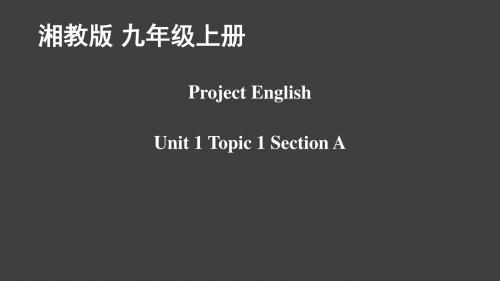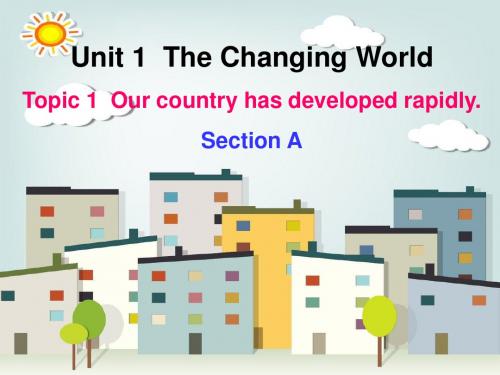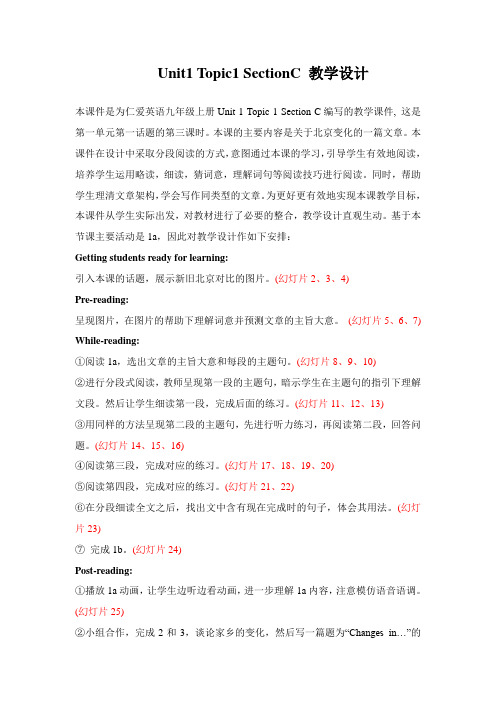仁爱版九年级英语上册 Unit 1 Topic 1 Section C 课件(共21张PPT)
仁爱版九年级英语上册Unit 1 Topic 1 Section C教案

Unit 1 The Changing WorldTopic 1 Section C教案Teaching aims and demands1. Learn some new words and useful expressions: communication, quick, keep in touch with, sort, rapid, progress, make progress2. Go on learning the present perfect tense.3. Compare the living conditions in the past with those at present.4. Learn about the children’s lives in the past and children’s happy life at present.Teaching aids录音机/投影仪/旧北京城的图片/新北京城的图片/多媒体Teaching PlanStep 1 Review1.检查作业,让学生在小组中交流自己的报告,然后小组推荐出一名学生向全体同学报告,师生互动,谈论父母或爷爷奶奶的童年生活。
For example:T: What do you think of your life at present?Ss: We live a happy life.T: Do you know what your granny’s life was like in the past? Who can tell us?S1: I know. She had a hard life during her childhood. Her parents couldn’t afford her education. Her family was very big and poor.S2: She used to be a child laborer…S3: . . .T: Very good. So you should study hard and enjoy today’s life.2.用多媒体或图片展出,旧北京城和现代北京城的照片并做比较从而引出生词。
仁爱英语九年级上册第一单元Topic 1SectionA(共30张PPT)

Jane
Kangkang
an English summer school
Maria
Place
India
Mount Huang
Cuba
Name
Rita
Jane Mount Huang
Kangkang
Maria
Plcae
India
an English summer school
Cuba
Maria has gone to Cuba. Kangkang been an to English summer Rita Jane hasto been been to Mount India. Huang. school. Example: has
hometown has become her _________ more and more _________ beautiful it is beautiful but there were people too many _______ to improve _______ his English and she will be back tomorrow ________
Jane
Kangkang
Maria
Cuba to be a _____ volunteer
1. What did Rita do in her hometown? 2. How does she feel about her hometown? 3. Why couldn't Jane take photos in Mount
Maria:
Have you seen her this morning?
Michael: Oh, she _________ has gone to the library. Maria: I will go and find her. By the way, where is Kangkang? Michael: He _________ has gone to the library, too. Let’s go and find them.
九年级英语上册 仁爱版.ppt课件

1.--Have you found him yet ? --Yes ,he has already gone home. yet, already 是副词,表示“已经,仍然, 还 ”。 already 多用于现在完成时态的肯定 句,可放在句中,也可放在句末。 yet常用在 现在完成时态的否定句和疑问句, 常放在句 末。 【链接】never 多用于否定陈述句,ever 多用 于疑问句,问初次经历,just 位于谓语动词 以后,before 一般放在句末。
Read 3a again and then mark (T) forTrue of (F) for False. (T )1.Kangkang thinks that China developed slowly in the past. (T ) 2.China has a larger population than any other country in the world. ( F) 3.China is developing more slowly than before because of China’s one-child policy. (T ) 4.Maria thinks it’s bad to be a “Little Emperor”. ( F) 5.It’s possible that Kangkang’s father was the only child in his family.
just already yet ever never
A: Have you ever been to France ? B: No, I have never been to any European . But Michael has just come back from France. He likes it very much. He says he has neverseen such a beautiful country before. A: Have you seen himyet ? B: Yes, I have already seen him.
仁爱英语九年级上册Unit1Topic1详细解读(共26张PPT)

“公共汽车来了。” (完全倒装) _H__e_re__h_e_c_o_m__e_s. “他来了。” (局部倒装)
3. Though I had no time to travel, I still felt very happy. 意思是“尽管我没时间去旅游,但我仍然感到很
Section B 1. 从……当中学习___l_e_a_rn_…__f_r_o_m_…____________ 2. 没有时间做某事___h_a_v_e_n_o__t_im__e_t_o_d_o__st_h_.____ 3. 表演有趣的节目_p_u_t _o_n_f_u_n_n_y_/i_n_t_er_e_s_ti_n_g_s_h_o_w__s 4. 一群老年人 _______a_g_r_o_u_p_o_f_o_l_d_p_e_o_p_l_e______ 5. 一些有意义的事___s_o_m__et_h_i_n_g_m__ea_n_i_n_g_f_u_l ____ 6. 上网聊天 _________c_h_a_t _o_n_li_n_e______________ 7. 跳绳 _____________ju_m__p_r_o_p_e_______________
Section D 1. (在……)发挥重要作用
____p_l_a_y_a_n__im__p_o_r_ta_n_t_p_a_r_t/_ro_l_e_(_i_n_.._.)___ 2. 下棋___________p_l_a_y_c_h_e_s_s___________ 3. 在某人空闲时间__in__o_n_e’_s_s_p_a_r_e/_f_re_e__ti_m_e_ 4. ……和……都___b_o_t_h__…__an_d_…__________ 5. 近几年_________i_n__re_c_e_n_t_y_e_a_rs________ 6. 出国旅游_______m__a_k_e_a__to_u_r_a_b_r_o_a_d____
Unit1+Topic+3+课文详解课件2023-2024学年仁爱版九年级英语上册

Section B
• Maria: What are you reading, Jane? be动词+V.ing (现在进行时)
• Jane: I’m reading a newspaper from Canada. Martin showed me an interesting article.
街区
事实上=in fact
wonderful place to live. Near our block, there are beautiful parks, good schools,
famous museums and excellent restaurants. And you can go to plays, concerts and
Lesson Three
Topic3 A-B
Words and passages
单词认读
背诵词汇
背诵词汇
词汇 1. with the money 2. so that 3. so...that... 4. in fact/as a matter of fact 5. come for a visit 6. in need 7. decide on sth. 8. provide sth. for sb./provide sb. with sth. 9. feel good about... 10. lend sth. to sb/lend sb. sth.
It is about a program that helps homeless people. show sb.sth.= show sth. to sb.
定语从句:从句充当形容词,修饰前面的program
给某人展示某物
仁爱版九年级英语上册 Unit 1 Topic 2 Section D 课件(共25张PPT)

例如:
1.Jane is cute, →So( )Maria. 2.Jane can swim. →So( )Maria. 3.Jane will swim. →So( )Maria. 4.Jane went swimming. →So( )Maria. 5.Jane often goes swimming. →So( )Maria. 6.Jane has been a swimmer for six years. . →So( )the twins.
* Neither / Nor + be/情态动词/助动词+主语 (全部倒装)
=含有either的否定句,表示上句所谈到的否定情 况也适合于另一主语
1.Jane isn’t cute, → Neither / Nor ( )Maria. 2.Jane can’t swim. → Neither / Nor ( )Maria. 3.Jane won’t swim. → Neither / Nor ( )Maria. 4.Jane didn’t go swimming. → Neither / Nor ( )Maria. 5.Jane doesn’t often go swimming. → Neither / Nor ( )Maria. 6.Jane hasn’t been a swimmer for six years. . → Neither / Nor ( )the twins.
Read through Sections A-C and fill in the blanks with the correct words.
I really _h_a_t_e___ going to a place like that.
仁爱版九年级英语上册 Unit 1 Topic 3 Section C 课件(共28张PPT)

there will be less ____ in the future.
The government in every country has worked for many years to support the homeless but more needs to be done.
1.What is one of the most basic human needs ?
One of the most basic human needs is a home.
2.Do all the people have their homes around the world ?
No, while most people around the world value their homes , there are many people in every country who are homeless .
Because of the wars, they have to live on the streets or in a shelter.
Let's guess.
Why are they homeless?
Because they don't have a job, 挣钱 or because they don't earn enough money.
Scanning--careful reading
Task 2: Read Paragraph 2 and 3 carefully and list the reasons(理由) for homelessness in whole sentences(完整句子).(4 mins)
仁爱科普版 英语 九年级上册 Unit 1 Topic 1 Section A

Jane
Mount _H_u_a_n_g___ with her p_a_r_e_n_t_s___ has been to
Kangkang
an English s_u_m__m__e_r school
it is beautiful but there were too many _p_e_o_p_le___
A: Where has Jane gone? I can’t find her.
B: She has gone to the library.
A: Where have Maria and her mother gone? I can’t find them.
B: They have gone to the shop.
Find the sentences with Present Perfect Tense.
You have just come back from your hometown. Great changes have taken place there and my hometown has become more and more beautiful. I have been to Mount Huang with my parents. Oh, she has gone to the library.
现在完成时: have/has + 过去分词
Act it out 三人一组,进行表演
(After a long holiday, Kangkang is happy to see his friends.)
Look, listen and say.
Key phrases and expressions:
仁爱版九年级英语上册-Unit-1-Topic-3-Section-A-课件

A 课件
2024/2/4
Learning objectives:
1.Listen and try to get some information about New York. 2.Make sentences with “ for ” and “ since ” using the Present Perfect
1.How does Bob like living in New York?
2H.WehtahtidnidksHeiltenishegarreaabto.uHt NeewreYaolrlky loves it.
in the past?
3S.Dhied HheeleanrdliktehliavitntghineNloewcaYol rtkrainffthice pwaasts? terrible and almost evWehryyoornwehydnroot?ve too fast. She also heard the streets were dirty.
Like this:
Broadway is a street in New York.
It … be dirty. But it … since the 1920s. There are many famous … along the street. Every year millions of visitors come to enjoy … music and dance.
When
We
be in Wuhan
2011
He
keep this book
two hours ago
仁爱版初中英语九年级上册 Unit1 topic 1 (共14张PPT)

THANK YOU!
Unit 1 The Changing World
Topic 1 Our country has developed rapidly. Section A
Welcome back to school How was your summer holiday?
A: Where have you been?
B: I have been to...
A: Where have you been? B: I have been to the park.
A: Where have you been? B: I have been to the bank.
A: Where has Mr. Brown gone? I can’t find him.
4. The Present Perfect Tense
1.Tell the differences between have/has gone to and have/has been to. I have been to Mount Huang with my parents. He has gone to the library, too. 2. Use them properly.
B 1. –– Where is Zhao Ming?
–– He ______ the playground. He is playing football there.
A. has been to
B. has gone to
C. have been to
D. goes to
A 2. Great changes ______ in my take place
C. have happened
【教案】仁爱版英语九年级上册Unit1 Topic1 SectionC教学设计

Para2:In the 1960s, the living conditions in the city were poor.
Para3:China has developed rapidly since the reform and opening-up.
2.China has_____(develop)rapidly since the reform and
教后反思
(学生分组讨论勐罕镇的变化。)
S1:clothes—past(old-fashioned)now(different colors)
S2: food—past(few meat)now(various)
S3:living—past(bamboo tower)now(big and beautiful)
T:What good news! The governor, Luo Hongjiang, will come to Menghan to know about the change of Xishuangbanna. You should tell him what has happened in these years in your hometown.
Step5 language use for more
Extended reading. Find a passage about the change and finish reading.
Step6 Summary
1.Key words and phrases.
2.The changes in Beijing.
仁爱版九年级英语上册 Unit1 Topic1 SectionC 教学设计

Unit1 Topic1 SectionC 教学设计本课件是为仁爱英语九年级上册Unit 1 Topic 1 Section C编写的教学课件, 这是第一单元第一话题的第三课时。
本课的主要内容是关于北京变化的一篇文章。
本课件在设计中采取分段阅读的方式,意图通过本课的学习,引导学生有效地阅读,培养学生运用略读,细读,猜词意,理解词句等阅读技巧进行阅读。
同时,帮助学生理清文章架构,学会写作同类型的文章。
为更好更有效地实现本课教学目标,本课件从学生实际出发,对教材进行了必要的整合,教学设计直观生动。
基于本节课主要活动是1a,因此对教学设计作如下安排:Getting students ready for learning:引入本课的话题,展示新旧北京对比的图片。
(幻灯片2、3、4)Pre-reading:呈现图片,在图片的帮助下理解词意并预测文章的主旨大意。
(幻灯片5、6、7) While-reading:①阅读1a,选出文章的主旨大意和每段的主题句。
(幻灯片8、9、10)②进行分段式阅读,教师呈现第一段的主题句,暗示学生在主题句的指引下理解文段。
然后让学生细读第一段,完成后面的练习。
(幻灯片11、12、13)③用同样的方法呈现第二段的主题句,先进行听力练习,再阅读第二段,回答问题。
(幻灯片14、15、16)④阅读第三段,完成对应的练习。
(幻灯片17、18、19、20)⑤阅读第四段,完成对应的练习。
(幻灯片21、22)⑥在分段细读全文之后,找出文中含有现在完成时的句子,体会其用法。
(幻灯片23)⑦完成1b。
(幻灯片24)Post-reading:①播放1a动画,让学生边听边看动画,进一步理解1a内容,注意模仿语音语调。
(幻灯片25)②小组合作,完成2和3,谈论家乡的变化,然后写一篇题为“Changes in…”的作文。
(幻灯片26、27、28)Assigning homework:①总结本堂课的新单词、短语和语法项目,让学生能把握整堂课的重点。
Unit1+Topic+2+课文详解+课件2023-2024学年仁爱版九年级英语上册

D. large
A 3. —Have you been to the village _______ ace.
— Oh, really? I will go there some day.
A. called
B. is called
C. calls
before, but I don’t want to go there any more.
• Maria:Why not?
not……any more=no……any longer再也不
why not+动词原形=why don’t you+动词原形 “为什么不……”
• Michael: Because there were too many people. We got lost and couldn’t find each other.
Though I had no time to travel, I still felt very happy. = I had no time to travel, but I still felt very happy. To help others makes us happy. make sb./sth. + adj.
很多 too many +可数名词复数 • Maria: Bad luck! Have you found him yet?
get lost= be lost迷路
你找到他了吗?
hate doing讨厌做某事
• Michael: No, he has probably gone home. Let’s call him up now. I really hate going to a
九年级英语仁爱版上册Unit1_Topic1_SectionC_同步课堂帮帮帮

Unit 1 The Changing WorldTopic 1 Section C目标梳理1. Recite Some new words: narrow, communication, various, report, relative, telegram, rapidly, since, satisfy, medical, cellphone, fax, machine, rapid, progress, already, pleased2. Master Some phrases: in the 1960s, keep in touch with, far away, reform and opening-up, satisfy people’s needs, medical care, make progress, succeed in doing sth.3. Some sentences: I think it is important to remember the past, live in the present and dream about the future.重点难点梳理1. Talk about the changes in a place.2. Use topic sentences to help us understand or write a passage.3. Figure out the meaning of a new word from the context知识梳理【1】She has lived in Beijing for more than forty years.她已经在北京住了40多年了。
*more than在此意为“超过,多于”,其后常跟数词,还可表示“不仅仅,非常,超出……的范围”。
e.g. There are more than seventy students in our class.我们班有70个学生。
仁爱版九年级英语上册 Unit 1 Topic 1 Section C 课件(共49张PPT)

Paragraph 3:
Topic sentence
China has developed rapidly since the reform and opening-up.
Read Paragraph 3 and mark T or F.
1. China has developed rapidly since the 1940s.
在20世纪60年代
生活条件 足够的食物
1. have the chance to do sth
2.receive a good education
3.ቤተ መጻሕፍቲ ባይዱee a doctor 4. keep in touch with
get in touch with lose touch with 5. far away far away from+地点 faraway
progress /'prəʊgres/
进步 n. 名词
make progress already
取得进展,取得进步
/ɔːl'redɪ/
已经,早已
adv. 副词
succeed in doing sth.
成功地做了某事
pleased
/pliːzd/
高兴的
adj. 形容词
Warm-up Phrases
1. in the past 2. at present 3. more than 4. interview sb. 5. see sth. oneself 6. in 1960s 7. living conditions 8. enough food
=food enough
在过去 现在,目前 超过,多于 采访某人 亲眼看见
- 1、下载文档前请自行甄别文档内容的完整性,平台不提供额外的编辑、内容补充、找答案等附加服务。
- 2、"仅部分预览"的文档,不可在线预览部分如存在完整性等问题,可反馈申请退款(可完整预览的文档不适用该条件!)。
- 3、如文档侵犯您的权益,请联系客服反馈,我们会尽快为您处理(人工客服工作时间:9:00-18:30)。
2. keep in touch 3. far away 4. progress 5. rapid 6. satisfy
B. the course of improving or developing
C. way of sending information
英语教学课件
仁爱版﹙九年级上册﹚
Unit 1 The Changing World
Topic 1 Our country has developed rapidly. Section C
Ⅰ. Aims and demands目标要求
• 1. 学习单词:narrow communication various report relative telegram rapidly reform satisfy medical fax machine rapid progress
2 Work in groups and talk about the changes in your hometown. Then report it to the class.
1. What was/were … like in the past?
2. What has happened to… nowadays?
China has developed rapidly since the reform and openingup.
telegram
communicate
v.
communications---
simple, slow
fax machine
cellphone = mobile phone
communications—various , quick, easy
When reading a passage, try to figure out the meaning of each new word by looking at the pictures or the context of the word.
In the 1960s, the living conditions in the city were poor.
确使用所学的现在完成时。
Have you ever been to Beijing?
Do you know about Beijing?
Look at the pictures of Beijing in the past and at present. Then guess the meaning of each word and the main idea of the text.
3. Whure?
It is important to write a topic sentence for each paragraph to help organize your thoughts.
3 Write a short passage on the topic Changes in… You should write its situation in the past and at present based on 2.
• 2. 学习短语: • keep in touch with…, reform and opening
up, make progress succeed in doing sth. • 3. 通过阅读了解北京的变化,并通过多种形
式的阅读活动培养基本的阅读技能。 • 4. 在读和说的基础上进行写作并在写作中正
1. He has lived in Hunan __si_n_ce__ (自从) 1998.
2. If you are friendly to others, you’ll have _m_o_r_e__an_d__m_o_r_e_ (越来越多) friends.
3. There are lots of clothes to _sa_t_is_f_y_______ _p_e_o_p_le_’_ s(满足人们的需求) in that shop. I like dnoeinegdsome shopping there.
conditions in the city were poor.
Paragraph 3. China has developed rapidly since
the reform and opening-up.
Paragraph 4. It is important to remember the
past, live in the present and dream about the future.
In the past… At present…
Changes in My Hometown
过去 1.旧房 2.步行、骑自行车上班 3.道路狭窄 4.居住条件差
现在 1.高楼 2.乘公交车、小汽车上班 3.环形路宽阔 4.居住环境舒适
write a passage
Changes in My Hometown ____________________________________ ____________________________________ ____________________________________ ____________________________________ _____________________________________ ____________________________________ ____________________________________ ____________________________________
List four changes in Beijing.
1) More and more ring roads and subways have appeared.
2) Buildings in Beijing are becoming taller and brighter.
3) There are more kinds of food and clothes to satisfy people’s needs.
Read 1a again finish1c
Topic sentences are usually at
Paragraph 1. She has tashpeeaberaenggrinantpihhn.georcthheaenndgineg sof in
Beijing herself.
Paragraph 2. In the 1960s, the living
several different
rhoaoudsse-s------narrow small, crowded ringhrocouoasmedsfs-o-r--t--awbildee
Listen to the passage in 1a, then answer the question
What’s the main idea of the passage?
Homework
1. Read 1a aloud.
2. Finish Section C in your workbook.
3. Write a passage on the topic Changes in… according to Part 3.
4. Preview Section D.
THANK YOU!
4) Children can study not only in modern schools but also on the Internet.
Fill in the blanks.
1. Li Ming has _m_a_d_e__g_re_a_t__p_ro_g_r_e_ss (取得很大进步) in English, because he studies hard.
= happy D. to make sb. pleased by
doing or giving them what they want E. write or phone or visit very often F. happening very quickly or in a short time
4. Tom is good at sports. He can _n_o_t _o_n_ly_ (不 仅) play basketball _b_u_t _a_ls_o_ (而且) play tennis.
5. You can send me the message by _f_a_x___ (传真).
2. China has succeeded in _s_e_n_d_in_g_
(send) Shenzhou Ⅹ into space.
3. I have _a_lr_e_a_d_y_(已经) had lunch. I am full.
Translate the words and phrases.
A. Beijing is the capital of China.
B. Beijing has developed rapidly.
C. Some information about old Beijing.
D. My trip to Beijing.
1b Read 1a and match the words and phrases with their meanings. ﹙finish1b﹚
